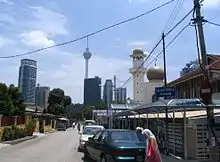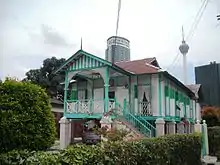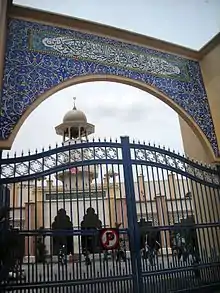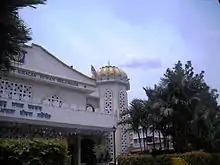Kampung Baru, Kuala Lumpur
Kampung Baru or "Kampong Bharu" (meaning "New Village") is a Malay enclave in central Kuala Lumpur, Malaysia. One of the most valuable tracts of land in the capital, it has been estimated to be worth up to US$1.4 billion. Kampung Baru's elders have turned developers away, saying they want to preserve their ethnic Malay lifestyle.

History

Colonial British administrators gazetted Kampung Baru as a Malay agricultural settlement in 1900 to allow the Malays to retain their village lifestyle within the city. Since then Kampung Baru has held out against development and modern-city living, turning into a political symbol of Malay culture.
The area held a special place for Malay politics during the pro-independence movement that grew up after World War II. Anti-colonial protests were held there, and founders of Malaysia's dominant political party, the United Malays National Organisation, held their early meetings there.
New evidence revealed by the National Archives of Malaysia shows that UMNO has its origins at the Sultan Sulaiman Club in Kampung Baru. Culture, Arts and Heritage Minister Datuk Seri Dr Rais Yatim said the documents were unearthed recently when some work was being carried out at the club.
Kampung Baru, which sprawls over almost 4 km2, also played a part in the May 13 Incident in 1969, where bloody racial clashes occurred between ethnic Malays and Chinese. The riots started after Chinese-led opposition parties marched through the village to celebrate their good showing in general elections of that year. New research (May 13: Declassified Documents on the Malaysian Riots of 1969) based on newly declassified documents at the Public Records Office in London, the book alleged that contrary to the official account which had blamed the violence on opposition parties, the riot had been intentionally started by the "ascendent state capitalist class" in UMNO as a coup d'état to topple the Tunku from power.
In recent years, Kampung Baru also played a central role in the Reformasi protests of 1998, when former deputy premier Anwar Ibrahim launched protests against then premier Mahathir Mohamad, calling for reforms to government and the judiciary.
Developments
Federal Territories Minister Datuk Seri Zulhasnan Rafique said the local plan for Kampung Baru in Kuala Lumpur would be unveiled to the public in April 2008. The plan was to present in detail the Government of Malaysia's development agenda for Kampung Baru. According to the minister, much thought had gone into drafting the plan with the government taking into account issues like the Malay image and land ownership. He also said the plan was drafted after many rounds of discussions with various parties. “A sum of RM100mil has been allocated under the Ninth Malaysia Plan for four to five projects requiring the government attention pertaining to land development and the improvement of infrastructures. Some of the money will be channelled to Kampung Baru for similar purposes,” Zulhasnan said.
Notable landmarks


- Kelab Sultan Sulaiman
- Galeri Kelab Sultan Sulaiman
- KJ11 Kampung Baru station, part of Kelana Jaya Line of Rapid KL
- Masjid Jamek Kampung Baru
- Rumah Limas Kampung Baru
- Master Mat's House
- Tatt Khalsa Diwan Gurdwara
- Jalan Raja Muda Musa
- Jalan Raja Alang
- Sikh Temple
- Saloma Link
Notable residents
- Tan Sri S.M. Salim - Malaysian singer
- Tan Sri SM Nasimuddin SM Amin - Naza Group Chairman
- Tan Sri Dato' Azman Hashim - AmBank Group Chairman
- Dato' Mohamed Azlan Hashim - Proton Ex Chairman
- Dato' Zainal Abidin Putih - Chairman CIMB Bank Bhd.
- Dato Mat Shah Safuan - businessman
- Dato Seri Drs Suleiman Mohamed - former Deputy Minister of Information, politician
- Allahyarham M Shariff - Malaysian singer
- Sheikh Hassan bin Sheikh Mubarak - businessman, trader
References
- Planet Ark - Malay Village Clings Onto its City-Centre Address
- New documents suggest Umno has origins in KL, The Star, 14 December 2007.
- Kampung Baru plan expected out in April, The Star, 26 January 2008.